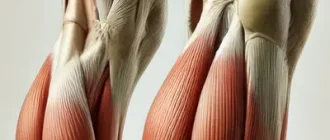During menopause, women’s bodies experience numerous transformations, such as hormonal changes that can lead to different symptoms. One frequent symptom during this phase could be breast pain or uneasiness. In this article, we will delve into the definition of breast pain in menopause, its causes, associated symptoms, potential risks, ways to treat it, and strategies to prevent it.
What is Breast Pain in Menopause?
Mastalgia, or breast pain, is the term used to describe any uncomfortable or tender sensations in the breast tissue. This pain can vary in intensity and may affect either one or both breasts. Hormonal shifts and reduced estrogen levels during menopause can lead to breast pain. The pain experienced can feel dull, achy, pulsating, or burning.
Causes of Breast Pain in Menopause
The specific reason for experiencing breast pain during menopause is not completely known. However, it is thought to be connected to hormonal imbalances. The levels of estrogen and progesterone can vary during the perimenopause phase and can contribute to breast pain. Other factors that might cause breast pain during menopause include changes in breast tissue, cysts, fibrocystic breast changes, inflammation, and muscle strain.
Related Symptoms
Breast pain that occurs during menopause may come with additional symptoms like swelling, lumpy breasts, discharge from the nipples, feeling of heaviness in the breasts, or an increase in breast size. It is also normal for the breasts to undergo changes in size or shape during this stage.
Is Breast Pain in Menopause Dangerous?
In the majority of situations, breast pain during menopause is usually not a sign of a serious medical issue. Nonetheless, it is important to seek advice from a healthcare expert if you have long-lasting or intense breast pain, or if you observe any new changes in your breasts such as lumps, alterations in the skin, or abnormalities in the nipples. This will guarantee that any possible causes or related conditions can be evaluated and addressed in the right way.
Treatment Measures
During menopause, there are various ways to lessen breast pain. Over-the-counter pain relievers like ibuprofen or acetaminophen can alleviate discomfort. Using warm compresses on the breasts or wearing a well-fitted supportive bra can also provide relief. When the pain is severe and affects daily activities, medical professionals might suggest hormone therapy or other prescribed medications to manage the symptoms.
Prevention Strategies
While it may not be feasible to entirely avoid breast pain in menopause, incorporating specific changes in one’s lifestyle can ease the discomfort it brings. These include:
- Wearing supportive bras: Purchasing properly fitting bras with adequate support can reduce breast discomfort and improve overall comfort.
- Limiting caffeine intake: Reducing the amount of coffee, tea, and other caffeinated drinks consumed may be advantageous as it has been associated with breast pain.
- Quitting smoking: The act of smoking has been correlated with a higher incidence of breast pain. Giving up smoking not only has positive effects on overall health, but it may also contribute to the reduction of discomfort experienced in the breasts.
- Maintaining a healthy weight: Having too much body weight can increase the pressure on the breasts, making pain worse. To relieve breast pain, it is important to maintain a healthy weight by following a well-balanced diet and engaging in regular physical activity.
FAQ
Q: How long does breast pain last during menopause?
A: The duration in which women experience breast pain during menopause can vary. While some may only have it for a few months, others may deal with it for a longer period. In general, breast pain associated with menopause typically resolves on its own over time.
Q: Why do breasts get bigger in menopause?
A: In menopause, changes in hormones can lead to a bigger bust. Lower estrogen levels might cause fat to be redistributed in the body, resulting in larger breasts. It should be noted, though, that not all women go through a growth in breast size during this stage.
Q: Does breast pain get worse with menopause?
A: Breast pain that occurs during menopause can differ from individual to individual. While some women may notice their breast pain getting worse during this stage, others may feel a reduction in pain or no pain whatsoever. It is crucial to seek advice from a healthcare provider to identify the root cause of breast pain and to explore suitable methods for managing it.
Q: When should I worry about breast pain during menopause?
A: Although hormonal fluctuations frequently cause breast pain during menopause, it is imperative to be vigilant for any alarming signs. If you observe any of the subsequent indications, it is advised to consult a healthcare professional:
- A new lump or mass in the breast
- Changes in breast skin, such as redness or dimpling
- Changes in the nipple, such as discharge or inversion
- Persistent, unexplained breast pain that does not improve over time
It is important to keep in mind that these symptoms might not directly be connected to menopause. Nonetheless, it is crucial to have a healthcare professional assess them to eliminate any possible underlying problems.
Conclusion
Breast pain during menopause can be an unpleasant symptom, but it is generally not something to worry about for most women. Nevertheless, it is crucial to pay attention to any changes and seek advice from a medical expert if experiencing intense or ongoing breast pain or noticing unfamiliar breast irregularities. By implementing appropriate management strategies and making lifestyle changes, women can find relief and successfully navigate through this phase of their lives.
About the Author
Reyus Mammadli is the author of this health blog since 2008. With a background in medical and biotechnical devices, he has over 15 years of experience working with medical literature and expert guidelines from WHO, CDC, Mayo Clinic, and others. His goal is to present clear, accurate health information for everyday readers — not as a substitute for medical advice.







